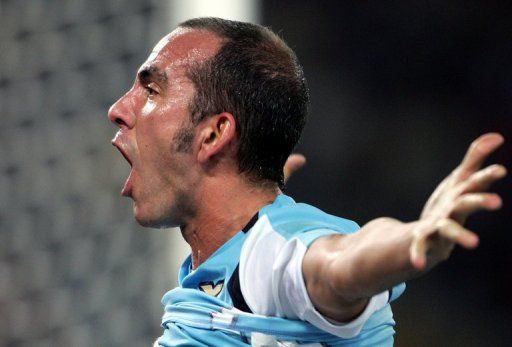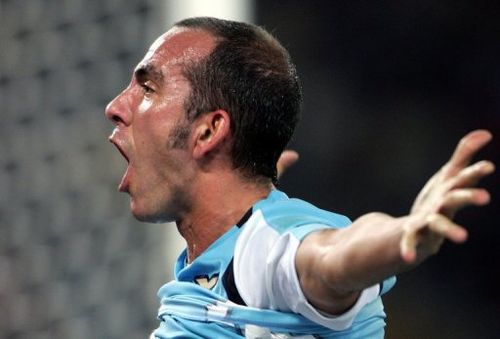
Di Canio defined by explosive style
LONDON (AFP) –

Paolo Di Canio at the Olympic stadium in Rome, playing for Lazio, January 6, 2005. New Sunderland manager di Canio’s time in management has been no less eventful than his colourful and controversial playing career.
As Swindon goalkeeper Wes Foderingham stormed angrily off the pitch just 21 minutes into his side’s clash against Preston, it quickly became clear that Paolo Di Canio’s time in management would be no less eventful than his colourful and controversial playing career.
Not for the first time in his life, Di Canio, who on Sunday was named as the surprise choice to replace Martin O’Neill as Sunderland manager, let his emotions get the better of him during League One Swindon’s trip to Deepdale in September last year.
The Italian has never been shy of taking the path less travelled, but even by his standards this was a bizarre moment as the Swindon boss substituted Foderingham less than halfway through the match because he felt his young goalkeeper wasn’t properly focused after he was at fault for Preston’s opening goal.
The incident perfectly encapsulates Di Canio’s volatile personality and a style of leadership that Swindon’s former chief executive Nick Watkins described as “management by hand grenade”.
Di Canio’s Swindon reign was explosive from the start. The club lost the sponsorship of the GMB trade union on announcement of his appointment in May 2011 because of his association with right-wing political beliefs.
Time and again Di Canio flouted managerial convention at Swindon as he brawled with striker Leon Clarke, sacked Paul Caddis as captain just months after he had skippered the club to promotion and reportedly went three months without giving his players a day off.
It is hardly surprising that another Swindon player described the 44-year-old’s reign as a “proper dictatorship”, yet his ability to motivate his players to perform for him is without question.
In just less than two years at Swindon, Di Canio took an unheralded collection of players to promotion from League Two, reached the Football League Trophy final and established the team as promotion contenders in the third tier before quitting in February following a dispute with the owners over the club’s parlous financial situation.
Di Canio, of course, is no stranger to controversy. That has been the defining characteristic of a career which has seen him worshipped and reviled in equal measure.
The Italian has always worn his heart on his sleeve and that passion and his penchant for moments of sublime inspiration made the forward an idol for fans from Rome to Glasgow and the East End of London.
At West Ham he produced an astonishing volley against Wimbledon in 2000 which was named the Premier League’s goal of the decade by one poll, and many Hammers fans still fondly remember his clever goal to win an FA Cup tie at Manchester United in 2001 when he ignored goalkeeper Fabien Barthez’s attempt to psyche him out with a false offside appeal.
Di Canio also won admirers when, in a noteworthy display of sportsmanship in 2000, he shunned a goal scoring opportunity and caught the ball from a cross as the Everton goalkeeper Paul Gerrard was lying injured on the ground after he twisted his knee attempting a clearance.
But the devil was never far from the surface with Di Canio either.
During his time with Sheffield Wednesday, he infamously earned an 11-match ban for pushing over referee Paul Alcock during a match against Arsenal in 1998.
And his political views, including a publicly expressed admiration for the fascist leader Benito Mussolini, have angered many, including Sunderland vice-chairman David Miliband, who resigned his position in protest at Di Canio’s beliefs.
In 2005, the Rome-born striker declared that he was “a fascist, not a racist”.
But his use of the Roman salute toward Lazio supporters, a gesture adopted by Italian fascists in the 20th century, earned a one-match ban and fine from the Italian FA.
Inevitably, Di Canio was unrepentant, saying: “I saluted my people with what for me is a sign of belonging to a group that holds true values, values of civility against the standardisation that this society imposes upon us.”